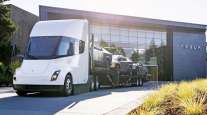Contributing Writer
Tesla Delays First Deliveries of Electric Semi to 2021

[Stay on top of transportation news: Get TTNews in your inbox.]
Tesla Inc. pushed back first deliveries of its Semi commercial tractor into next year, making the truck two years behind its original schedule.
The Palo Alto, Calif., electric vehicle builder said in its first quarter earnings report that it has delayed the first deliveries until 2021. When Tesla unveiled the first prototypes of the truck in 2017, it said the tractor would start production in 2019.
Tesla did not provide a reason and did not respond to an email from Transport Topics. Tesla CEO Elon Musk said on the social media platform Twitter last month that he would likely provide an update on the Semi later this year.
The delay looks to be a combination of a tight battery supply and the manufacturing disruptions created by the coronavirus pandemic, according to a Morgan Stanley trucking industry analyst.

Musk
“This decision is not a major surprise given COVID-related manufacturing disruptions at Tesla and in no way is a reflection of the technological or commercial feasibility of the Semi program, in our view,” Ravi Shanker, a Morgan Stanley analyst wrote in a May 4 report to investors.
At least part of the delay is because heavy-duty truck production would divert battery cells from Tesla’s passenger car business, which is starting to operate profitably, Shanker said.
“If production of the Tesla Semi were to ramp up meaningfully, Model 3 or Model Y car production would decline,” Shanker said.
He said work on what he described as a “longhaul electric, platooning-capable autonomous truck” continues.
Tesla has received several large pre-orders and follow-on orders for the Semi, which has been testing on public roads for several years.
UPS Inc. is looking to put 125 into service as an initial test, said Michael McDonald, UPS director of maintenance and engineering for sustainability and government affairs. PepsiCo has ordered 15 to use at a Frito Lay facility in Modesto, Calif. Anheuser-Busch said it has 40 on order as part of a companywide strategy to employ cutting-edge technology such as autonomous trucks and to reduce its environmental impact.
Shanker noted there is a crowd developing in the electric truck business.
“We expect the Tesla Semi to be joined many other products from incumbent OEMs and startup OEMs in the next 1-2 years,” Shanker said.
Daimler Trucks North America, Volvo Trucks, Paccar and Navistar all are developing electric trucks for the U.S. market, though the pandemic may delay some of those programs. Daimler, with its eCascadia, and Volvo, with its VNR Electric, both plan to launch commercial production of their electric trucks next year.
But Tesla may yet prove itself an able competitor against mature manufacturers, Alexander Potter, an analyst with Piper Sandler, said in a report to investors.
“The company’s increasingly global footprint should drastically reduce logistics cost, while rising software content is a margin tailwind that no other automaker can replicate,” Potter said.
In a conference call with industry analysts and investors last month Musk continued to make his case for electric vehicle adoption.

Host Seth Clevenger speaks with Mike Perkins and Derrick Loo, test drivers at Peloton Technology, one of the companies at the forefront of developing truck platooning systems. Hear a snippet, above, and get the full program by going to RoadSigns.TTNews.com.
“We really need to figure out where is the transportation of the future and not the transportation of the past. You know, if this was 1920, do you want to be investing in steam engines or internal combustion engines? Obviously not steam engine,” Musk said.
Tesla plans to sell two versions of the Semi. It has announced an “expected” $150,000 base price for the model with a 300-mile range. That jumps to $180,000 for a truck with an expected 500-mile range.
Four independent motors on the rear axles will power the truck. Tesla has said it will have faster acceleration than a diesel counterpart, going from zero to 60 mph in 20 seconds while hauling an 80,000-pound load. Like other electric truck builders, Tesla said it will cost less to operate and maintain than a diesel tractor.
Want more news? Listen to today's daily briefing:




